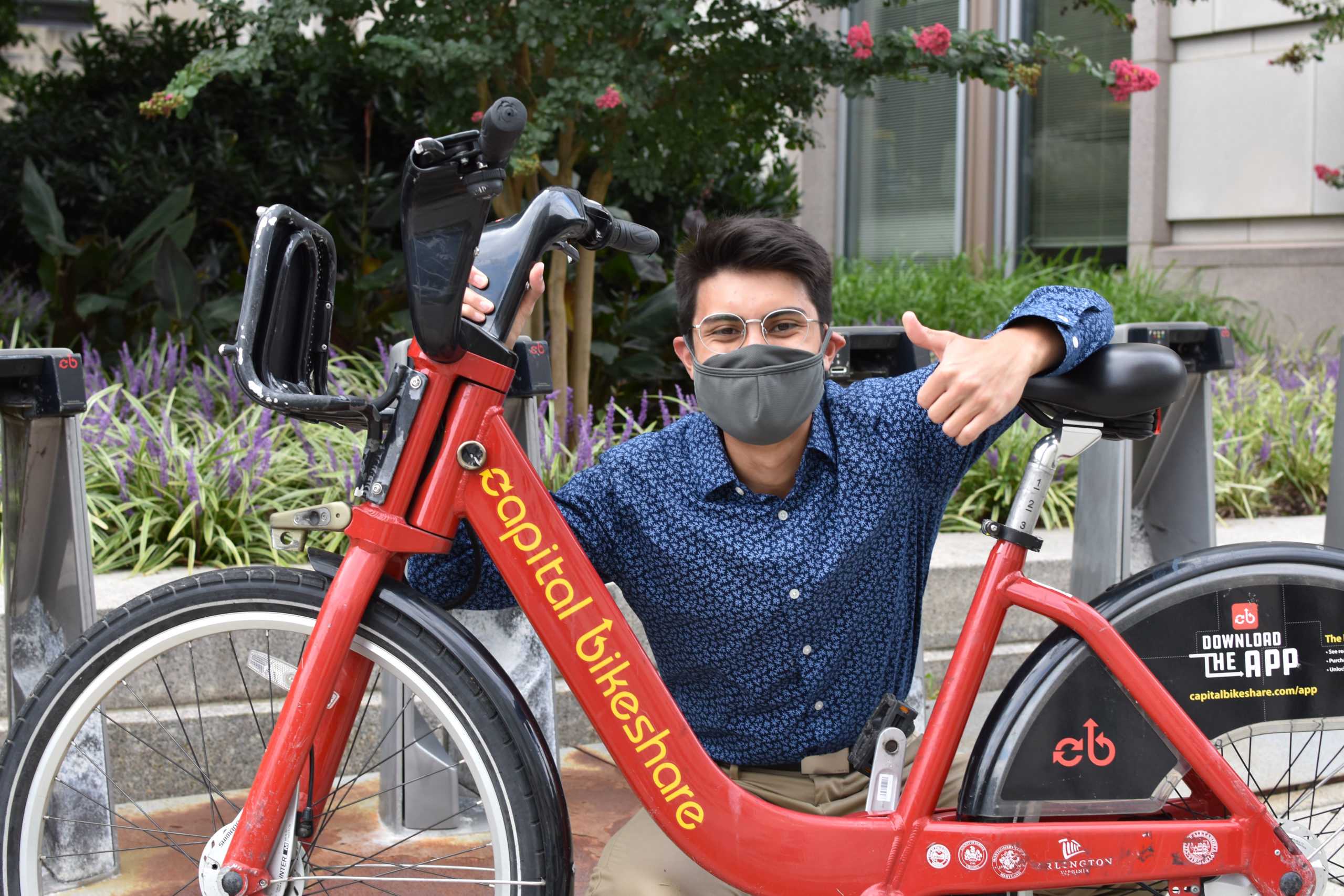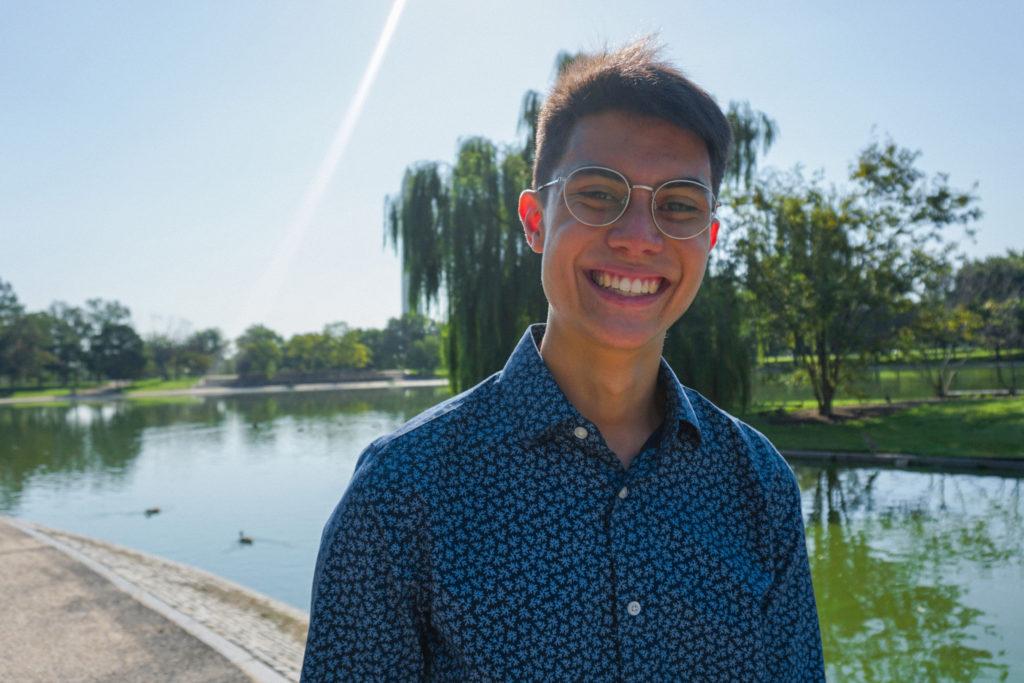A student leader is launching a write-in campaign for a seat on the Foggy Bottom and West End Advisory Neighborhood Commission.
Senior Yannik Omictin, the Student Association’s vice president for government relations, launched his bid Monday to represent residents living in the District, including 1959 E St., Mitchell and Thurston halls and multiple apartment buildings on campus. Omictin said if elected, he wants to advocate for a student Metro pass, expanded bike lanes, more aid for individuals experiencing homelessness and protection for minorities and protesters from police brutality.
“I have a really deep passion for making sure that cities are safe and life-affirming for everyone, and coupled with the fact that I saw this opportunity, I said, ‘You know, there’s an opportunity to make a real difference here, and I might as well try it out,’” Omictin said.
Omictin said the number of vacancies on the commission prompted him to campaign in hopes of connecting students with the city beyond GW’s campus. Commissioners Detrick Campbell and William Kennedy Smith resigned this summer, and Commissioners James Harnett, Patrick Kennedy and Nicole Goldin will not run for reelection at the end of the term, leaving five of the ANC’s eight seats open during the election.
Omictin said he launched a write-in campaign because he decided to run after the city’s deadline for candidates to submit signatures to qualify for the ballot had already passed. The ANC ballot did not draw any candidates for the seat Omictin is vying for, which Kennedy currently occupies.
He said he will connect with voters via social media and email throughout his campaign and suggests the ANC publish newsletters and video updates to engage local community members and even student organizations like the SA.
Omictin said he would push for a student Metro pass through negotiations with officials about whether or not it will be mandatory, how much it will cost and whether the pass will carry access to both trains and buses. He said releasing the pass “might take a little time” because of budget concerns Metro officials have faced after losing government funding during the pandemic.
For years, student leaders have pressured officials to provide students with discounted access to the Metro, but officials have previously said it’s not “feasible or fair” financially. Omictin said once students agree on a plan for the Metro pass, he is confident they can convince officials to approve the plan.
“This is something that we’ve talked about forever as GW students,” Omictin said. “It is long overdue for us to have some way to connect to the city in a way that doesn’t break the bank.”
Omictin also said he hopes to bolster bike infrastructure through two-way bike lanes on F and 17th streets, which he said can be “very dangerous” for tourists and locals commuting to offices near the White House and downtown.
Over the past two years, ANC commissioners spearheaded plans for DDOT officials to install protected bike lanes on G, 20th and 21st streets. Commissioners also passed a resolution in March 2019 to add more bikes to the Capital Bikeshare stations on campus before city officials launched a $25 membership pass for D.C. students.

Courtesy of Trinity Bell
He added that he will pressure officials to defund the Metropolitan Police Department and protect the rights of protesters and Black and Brown people in the neighborhood, referring to this month’s police shooting of 18-year-old Deon Kay and police violence against protesters in Lafayette Square this summer.
“I do support calls to reallocate funds from MPD and to social services and making sure that police are not brutalizing folks,” Omictin said. “I think that’s a pretty straightforward and simple proposition.”
Protecting individuals experiencing homelessness and being stuck in the “food desert” near the southeastern end of campus is another focus of Omictin’s campaign. Earlier this year, SA President Howard Brookins said research classifying the region as a food desert necessitates a student-run food cooperative near Thurston, Mitchell and Potomac halls to combat food insecurity.
Omictin said officials should consider installing a free community fridge or garden in a “publicly accessible location” in the neighborhood since Whole Foods, the closest grocery store in the area, sits on the other side of campus. Omictin said restaurants, grocery stores and community members would fund the community fridge.
“I would really like to see us become a community that respects those folks, like they are our neighbors, because they are and see what that partnership and what that community brings,” he said.
He said the neighborhood should also receive “sufficient input” in the eviction process from tenants or people living in tent encampments. Mayor Muriel Bowser spoke at a Foggy Bottom and West End ANC meeting last year to address how individuals experiencing homelessness fail to comply with the District’s encampment-clearing protocol since they don’t move into public shelters the city offers them.
Omictin said people are reluctant to settle into public shelters because of services they utilize in their community or prior trauma they’ve previously suffered in other shelters. Individuals experiencing homelessness are “no different” than students living in D.C. for a limited time – “we just started on different playing fields,” he said.
“Evicting people in tents is inhumane, violent and wholly ineffective, and when I say we, as the housed community in Foggy Bottom, should get involved, I mean we should be recognizing people as human beings first, and our unhoused neighbors as humans for whom the system didn’t work,” Omictin said.








